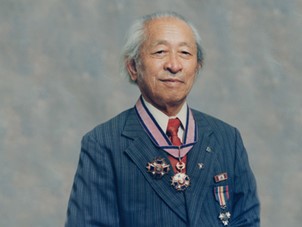
‘The basis of the view of life is human personality.’
‘Forming a creative, productive, and ideal personality is the goal and content of modern education.
- Seongsan Rhee Young-shik
‘Forming a creative, productive, and ideal personality is the goal and content of modern education.
- Seongsan Rhee Young-shik
| 1919. 3. 1 | Imprisoned for involvement in Korea’s independence movement |
|---|---|
| 1927. 4 | Served as a Pastor in Seomun Church in Daegu |
| 1946. 4 | Founded Daegu Blind School (appointed as school head) |
| 1956. 6 | Founded Korea Social Work Institute (appointed as inaugural rector) |
| 1969. 5. 16 | Awarded the main prize of the National Award for Education |
| 1977. 11 | Served as an advisor to the Overseas Sacrifice Korean Memorial Service Association |
As a student representative, Reverend Rhee actively participated in the Manse Movement. He led the movement by secretly bringing 23 copies of the Declaration of Independence and joining his wife’s family and church members at Jinpyeong-dong Church in Indong-myeon, Chilgok-gun at 11 p.m. He also worked in the secret society Hyeseongdan and urged the rise of Korea’s national movement while conducting activities such as the business suspension movement and preparing military funds for the independence movement. At that time, he was arrested for distributing documents urging Korean merchants to halt commerce with Japanese people in downtown Daegu and served six months in prison. He continued to campaign for independence across the country after that, and was sentenced to one year and six months in prison.
Reverend Rhee returned to Korea in March 1927 and worked with leprosy patients, earning the beautiful name of "the second savior" from leprosy patients in Gyeongsangbuk-do. Throughout his 20 years of work in the church, his plan for educational work to achieve great ambition was a special education promotion project to start a new chapter in education for the disabled, which served as an independence commemoration project. Reverend Rhee laid the foundation for special education in Daegu with the establishment of the Daegu Blind School, which became the birthplace of ‘Daegu University’. Daegu Blind School continued its mandate by producing graduates and accepting new students despite operational difficulties caused by having to change locations during the Korean War. On March 19, 1953, there was a groundbreaking ceremony for the construction of the new school building, and on April 13 of the following year, the city of Daegu donated about 10,000 pyeong (33,000 square meters) of cemetery land in Daemyeong-dong to the school. With the completion of the main building on December 11, 1954, the school was developed into a special school equipped with both a lecture building and a dormitory. Reverend Rhee continued to work for Korea's special education and received a number of awards for independent distinguished service and social welfare service merit, including: the Ministry of Health and Social Affairs Award in November 1953; the Ministry of Culture (Education section) Award in August 1963; the Ministry of Education Award in November 1966; the Presidential Award in March 1968; the 5.16 National Medal (Education section) in May 1969; the 25th Foundation Day Commemoration Order of Civil Merit, Peony Medal in August 1970; the National Foundation Medal in December 1977; and the Order of Merit for National Foundation, Patriot Medal in December 1990. In April 1965, he participated in the Pan Pacific International Conference on Rehabilitation of Persons with Disabilities as a Korea representative at the invitation of the Japanese Ministry of Health and Welfare. The life and activities of Reverend Seongsan Rhee Young-shik were highly regarded in foreign countries, so he signed a contract to publish his autobiography with an American publisher in New York during an educational inspection trip there. In September 1970, Dunlop Publishing published "I Cast out Fear" in the United States.
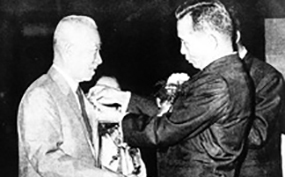 | Awarded the main prize of the National Award for Education |
|---|---|
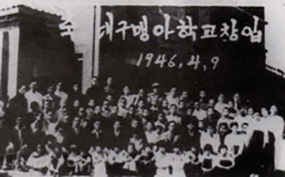 | Commemorating the Foundation of Daegu Blind School in 1946 |
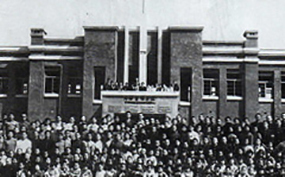 | Commemorating the new building construction of Daegu Blind School |
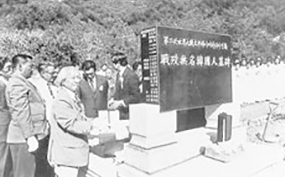 | Saipan's unveiling ceremony of tombstones of unknown Koreans who died in wars |
Reverend Rhee Young-shik carried out the work of human dignity even after the age of 80. One of his outstanding projects was to return the remains of Koreans who had been forcibly recruited from Saipan and Tinian during World War II to Korea. In 1977, he formed a promotion committee after obtaining permission to return the remains of the fallen soldiers from the ‘Committee for the Promotion of Overseas Koreans' Visit to Their Motherland’ under the Ministry of Health and Welfare. Through this project, he buried the remains of more than 5,000 fallen Koreans. Reverend Rhee died in Guam in December 1981 after living a healthy life. During his life, he kept his distance from politics and in his will asked Dr. Rhee Tae-Young, Daegu University’s first president, not to get involved in politics. Despite being an independence fighter, Reverend Rhee’s motivation was to overcome the pain and frustration of the people. He did not seek fame and prestige for himself. Thanks to his devotion to shedding light on society’s dark areas while himself living within them, he was able to establish today’s affiliated institutions under the academic corporation, Young Gwang Academy.
